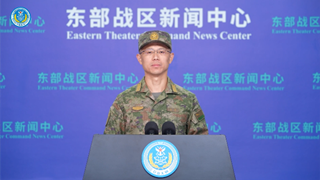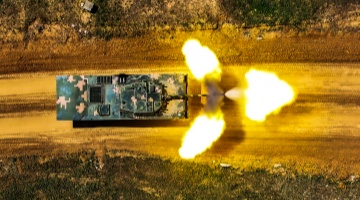By Haijing
At the end of March, the US government announced that it had notified Russia that it would stop exchanging some data on nuclear weapons. This move is seen by the outside world as a response to Russia's announcement in February on the suspension of the New START Treaty. Russian officials have repeatedly stated that both sides are still in contact regarding the implementation of the treaty, but progress has been minimal, and major breakthroughs can hardly be seen. Various signs indicate that the survival of the New START Treaty, as the only pillar of the current US-Russia bilateral arms control system, is in jeopardy, and this issue has attracted high attention from the international community.
The only remaining arms control treaty between the US and Russia.
The New START Treaty was signed by Russia and the US in 2010, which came into force on February 5, 2011 and has a validity period of 10 years. On February 3, 2021, the two sides exchanged diplomatic notes and completed the internal procedures for extending the New START Treaty's validity period. The agreement came into effect immediately, and the treaty's validity period was extended to February 5, 2026, with no content changed.
The reason why this treaty was named "New" is because it reflects the latest results of the US-Russia nuclear arms reduction negotiations. The treaty mainly includes three aspects. First, the US and Russia can each deploy no more than 1,550 strategic nuclear warheads and 800 nuclear warhead delivery vehicles. Second, the compliance verification mechanism is clarified, and the two parties can conduct up to 18 on-the-spot verifications with short notice with each other annually. Third, it agrees to the establishment of the Bilateral Consultative Commission composed of nuclear experts from the US and Russia and the commission will hold meetings twice a year to discuss issues related to the implementation of the treaty. In addition, the treaty also stipulates that when one party moves strategic nuclear weapons for reasons such as deployment, maintenance, and repair, it needs to notify the other party.
The New START Treaty has great significance, and it plays a critical role as a global strategic stabilizer. The US and Russia possess more than 90 percent of the world's nuclear weapons. Limiting the deployment of strategic nuclear weapons by both countries and reducing the number of deployed nuclear weapons to the lowest level in over half a century is conducive to maintaining global security. It should be emphasized that after the expiration of the Intermediate-Range Nuclear Forces Treaty between Russia and the US in 2019, the New START Treaty has become the only arms control treaty between the two countries. Its continuation or termination will have an important impact on global strategic stability and the international arms control system.
Nuclear arms control negotiations have once again become a means of game
Currently, the on-the-spot verifications specified in the New START Treaty have been suspended for three years, and the bilateral commission established under the treaty has long ceased operations. In fact, the treaty had already been paralyzed before Russia announced the suspension of its compliance in February. The root cause of this situation is the new round of power struggles and games between the US and Russia.
From a military perspective, there are significant structural contradictions between the US and Russia in arms control. In recent years, the two sides have had constant disputes over the contents specified in the New START Treaty. The US hopes to include Russia's Sarmat intercontinental ballistic missiles, Avangard hypersonic missiles, Poseidon nuclear-powered torpedoes, Burevestnik (Petrel) nuclear-powered cruise missiles, and many other new weapons in the agenda of strategic arms reduction to achieve the goal of containing Russia. In response, Russia has proposed that the US has not fulfilled its nuclear disarmament obligations stipulated in the treaty, and that the US missile defense systems and space weapons should also be included in the New START Treaty.
Objectively speaking, the treaty is of great significance to both sides when their relations are relatively stable. For the US, the treaty's existence can help restrict Russia's strategic nuclear forces in a verifiable manner. For Russia, the treaty's continuation is beneficial to maintaining its position in the international strategic stability field, easing confrontation with the US, and avoiding being dragged into a costly arms race. This time, Russia's announcement to suspend compliance is mainly aimed at using nuclear deterrence to counterbalance NATO, especially when the US' ongoing military aid to Ukraine continues.
Discontinuation of the treaty will exacerbate global security risks
For now, neither the US nor Russia wants to be labeled as a treaty-breaker. While Russia has announced the suspension of compliance, it has not said it will withdraw from the treaty, which left the option open for the future. When Russian President Vladimir Putin announced the suspension of compliance on February 21, the Russian Ministry of Foreign Affairs issued a statement saying that "the decision to suspend the New START Treaty can be reversed if Washington takes honest efforts towards general de-escalation and the creation of conditions for resuming the comprehensive operation of the Treaty".
As the hostility between the two countries continues to escalate due to the conflict between Russia and Ukraine, it also means that both countries are finding it difficult to make substantive compromises or concessions on key arms control issues. It is foreseeable that in the short term, US-Russia relations are unlikely to return to the state when the treaty was born. In addition, the US is accelerating the development of missile defense systems, lasers, and space weapons, and is continuously striving to catch up in the field of hypersonic missiles, and even intentionally proliferating nuclear technology. All these actions are shaking the foundation of stable US-Russian strategic relations.
The New START Treaty between the US and Russia has been largely undermined at present. Given the status quo of US-Russia relations, even if there is no withdrawal from the treaty, it will face significant challenges in extending beyond its expiration date in 2026. If the treaty no longer exists, it will have a significant negative impact on US-Russia nuclear arms control and even global security. As a result, the possible nuclear arms race could significantly increase global security risks.









